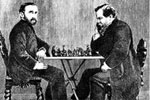


ChessBase 17 - Mega package - Edition 2024
It is the program of choice for anyone who loves the game and wants to know more about it. Start your personal success story with ChessBase and enjoy the game even more.
Dennis Monokroussos writes:
We’re all enjoying the World Championship in Mexico City, the newest iteration in a series going back to 1886. The game has come a long way since then. Nowadays, we have a champion who utilizes openings like the Slav and the Berlin Defense with the Black pieces, whereas in 1886, Johannes Zukertort, in his match with Wilhelm Steinitz, played openings like…the Slav and the Berlin Defense!
Of course, chess has developed by leaps and bounds the past 121 years, but there are commonalities and things we can still learn from the players of those days and their games. So this week, to supplement the gap left by the first rest day in Mexico City, we’ll look at the crucial sixth game of the Steinitz-Zukertort match. Steinitz won game 1, but then Zukertort won four games in a row to completely take over the momentum. (Draws? What draws? They only split the point five times in twenty games.) Steinitz desperately needed to stop the bleeding, and this game marked the start of a comeback that made him the first official world champion.

Playing the Berlin: Johannes Zukertort vs Wilhelm Steinitz in 1886
The game was a Berlin Defense, but before you all fall asleep, it was a very sharp line, one which sometimes causes trouble to even very strong contemporary players. So one benefit of tuning in is that you can add a very dangerous weapon to your opening arsenal! Second, it’s an excellent game from start to finish: interesting opening play, a well-played middlegame attack, and excellent endgame technique by Steinitz to finish it off. Third, there’s a curious feature of this game that could not have happened nowadays (or at least wouldn’t have). And fourth, I’ll be in Mexico City for about a week, so this will be your last chance for a while to see one of my shows!
Remember, although it’s on an unusual day (Monday night), it’s at the usual time: 9 p.m. ET, 3 a.m. CET. (But remember, European non-night owls, you can watch the shows in the archives starting almost immediately after they finish.)
Dennis Monokroussos' Radio ChessBase lectures begin on Thursdays at 9 p.m. EDT, which translates to 01:00h GMT, 02:00 Paris/Berlin, 11:00h Sydney (on Friday). Other time zones can be found at the bottom of this page. You can use Fritz or any Fritz-compatible program (Shredder, Junior, Tiger, Hiarcs) to follow the lectures, or download a free trial client. |
You can find the exact times for different locations in the world at World Time and Date. Exact times for most larger cities are here. And you can watch older lectures by Dennis Monokroussos offline in the Chess Media System room of Playchess:

Enter the above archive room and click on "Games" to see the lectures. The lectures, which can go for an hour or more, will cost you between one and two ducats. That is the equivalent of 10-20 Euro cents (14-28 US cents).
 Dennis
Monokroussos is 40, lives in South Bend, IN, and is an adjunct professor
of philosophy at the University of Notre Dame.
Dennis
Monokroussos is 40, lives in South Bend, IN, and is an adjunct professor
of philosophy at the University of Notre Dame.
He is fairly inactive as a player right now, spending most of his non-philosophy time being a husband and teaching chess. At one time he was one of the strongest juniors in the U.S., but quit for about eight years starting in his early 20s. His highest rating was 2434 USCF, but he has now fallen to the low-mid 2300s – "too much blitz, too little tournament chess", he says.
Dennis has been working as a chess teacher for seven years now, giving lessons to adults and kids both in person and on the internet, worked for a number of years for New York’s Chess In The Schools program, where he was one of the coaches of the 1997-8 US K-8 championship team from the Bronx, and was very active in working with many of CITS’s most talented juniors.
When Dennis Monokroussos presents a game, there are usually two main areas of focus: the opening-to-middlegame transition and the key moments of the middlegame (or endgame, when applicable). With respect to the latter, he attempts to present some serious analysis culled from his best sources (both text and database), which he has checked with his own efforts and then double-checked with his chess software.